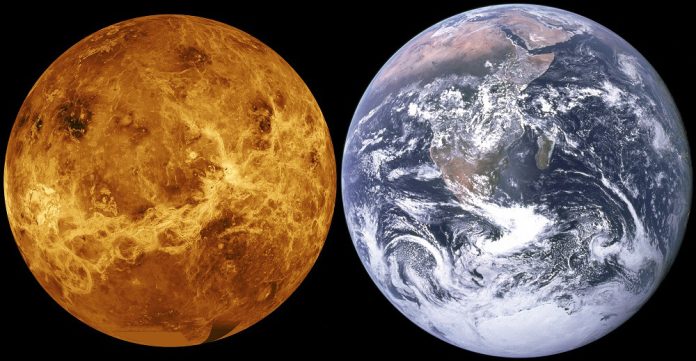
A new study by astronomers at the University of Cambridge has revealed that Venus, Earth’s closest neighbor, may never have had liquid water or been a planet where life could exist.
This discovery challenges earlier theories that Venus was once like Earth but became uninhabitable due to a runaway greenhouse effect.
The research, published in Nature Astronomy, looked at the chemical composition of Venus’s atmosphere.
The findings suggest that Venus’s interior is too dry to have ever had the water needed for oceans.
This makes it unlikely that Venus could have supported life similar to Earth’s.
For decades, scientists have speculated that Venus might have had liquid water billions of years ago or that life might exist in its thick, cloudy atmosphere.
However, Tereza Constantinou, the study’s lead author and a Ph.D. student at Cambridge, explains that this is unlikely. “Given Venus likely never had oceans, it’s hard to imagine it ever supporting Earth-like life, which requires liquid water,” she said.
Venus is often called Earth’s “evil twin” because of its similar size and rocky surface, but the similarities end there.
Its thick clouds of sulfuric acid and scorching surface temperatures of about 500°C make it one of the most hostile places in the solar system.
Scientists have proposed two main theories about Venus’s history. The first suggests Venus may have once had a mild climate and liquid water, but intense volcanic activity triggered a greenhouse effect, turning the planet into the uninhabitable world we see today.
The second theory suggests Venus was born extremely hot and has always been too dry for water to condense.
The Cambridge team took a new approach by studying Venus’s atmospheric chemistry. They examined how volcanic gases sustain the planet’s atmosphere, which is constantly interacting with the planet’s interior. They discovered that Venus’s volcanic eruptions contain very little water—less than six percent—indicating that the planet’s interior has been dry throughout its history.
NASA’s upcoming DAVINCI mission, set for the end of this decade, aims to study Venus further with flybys and a surface probe. These efforts could confirm whether Venus has always been a dry, inhospitable world.
This discovery has important implications for the search for life beyond our solar system. Many exoplanets resemble Venus more than Earth. If Venus has always been uninhabitable, it suggests that Venus-like exoplanets are unlikely to support life.
“It’s a bit sad to learn Venus was never like Earth,” said Constantinou. “But this helps us focus on searching for planets that are truly promising for life—planets more like our own.”
Source: University of Cambridge.



